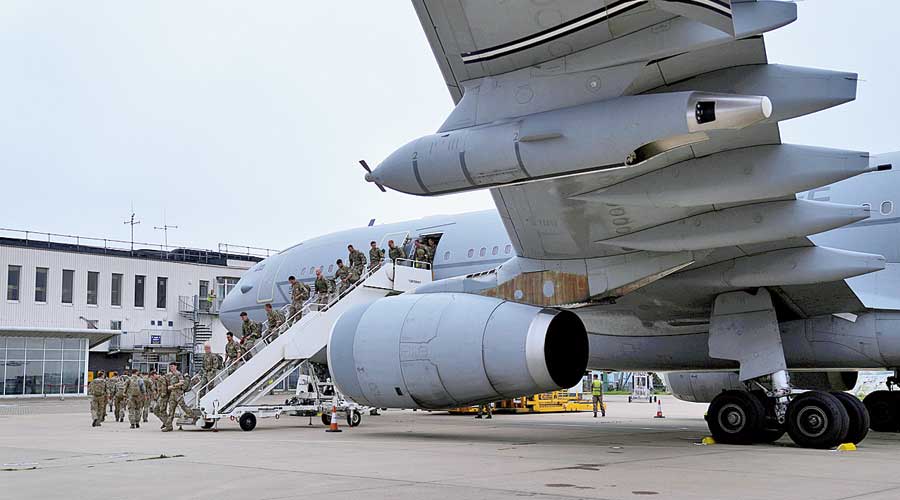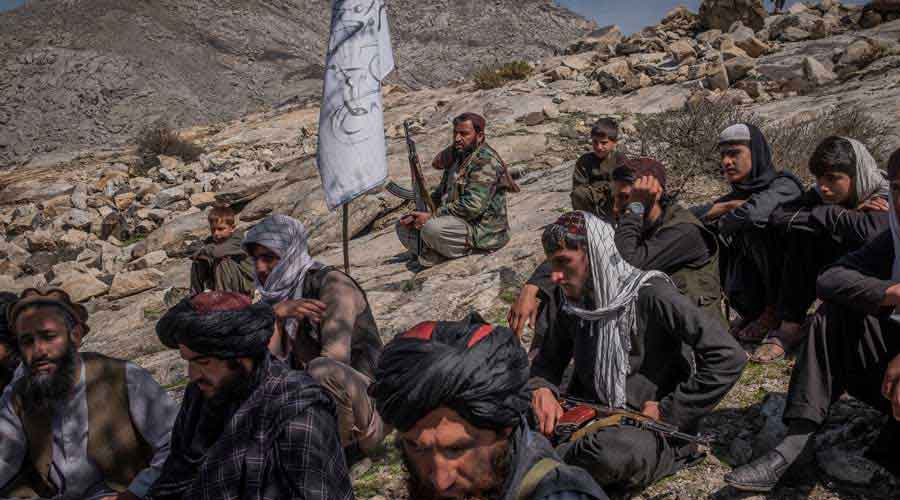The Pentagon said that two Islamic State militants were killed and one was wounded in Friday night’s drone strike in Nangahar province as part of the American retaliation for the suicide bombing at the Kabul airport that killed scores of people, including 13 American service members.
Defence department officials said one of the IS drone targets was a “planner”, and one was a “facilitator”. Both, they said, were involved in planning attacks against Americans, although officials at a news conference on Saturday declined to say whether they were involved specifically in the Kabul airport attack.
There remains a threat to American troops and civilians at the Kabul airport, officials said, making the ongoing evacuation effort perilous.
For the first time, Pentagon officials publicly acknowledged the possibility that some of the people killed in the aftermath of the suicide bombing at Kabul airport may have died in gunfire coming from American service members after the suicide bomber detonated himself.
Pentagon officials have previously said there was gunfire after the bombing, but were unsure where it emanated. Investigators are looking into whether the shots came from Americans at the gate, or from the IS, which claimed responsibility for the suicide bombing.
“We can’t confirm that,” Pentagon press secretary John F. Kirby said during a news conference on Saturday. But, he added that the defence department was “not in position to deny it either”.
Defence department officials declined to name the IS planner and facilitator killed in the drone strike in Nangahar, near the Pakistan border.
“They were IS-K planners and facilitators and that’s enough reason there alone,” Kirby said, referring to the Islamic State Khorasan.
The strike, carried out by a single MQ-9 Reaper drone flying out of a base in the UAE, struck in Jalalabad, the capital of Nangahar province, and killed an IS-K planner known to US intelligence analysts for developing a specific type of attack in the Kabul area, a senior US military official said later.
The planner was believed to be involved in future plots against targets in Kabul, including the airport, but there was no immediate evidence that he had plotted Thursday’s attack outside the airport.
The planner and an associate were driving in a car in Jalalabad when the drone’s Hellfire missile killed them, the official said. A third person in a building nearby was injured in the drone blast. No civilian casualties reported.
With three days to go before President Biden’s August 31 deadline for withdrawal, the American troops at the Kabul airport have begun what the military is calling their “retrograde ,” meaning service members are getting on planes and leaving too.
A military official said there are now around 4,000 American troops on the ground in Kabul, down from a peak of 5,800. Kirby said American citizens and Afghan allies continue to be allowed into the airport and onto departing planes.
Taliban slam attack
The main Taliban spokesman, Zabihullah Mujahid, condemned drone strike as a “clear attack on Afghan territory”.
“The Americans should have informed us (Taliban) before conducting the airstrike, it was a clear attack on Afghan territory,” he said.
Evacuation flights
Evacuation flights from the airport in Kabul began winding down on Saturday as the US prepared to withdraw its remaining troops from Afghanistan amid continued threats of terrorist attacks.
Britain’s evacuation of its citizens was ending on Saturday, and the country was beginning to bring its remaining troops home, Nick Carter, the chief of the defence staff, told the BBC’s Radio 4.
The departure of troops signalled a tumultuous end to a 20-year war that has left Afghanistan awash in grief and desperation, with many residents fearing for their lives under Taliban rule.
“We haven’t been able to bring everybody out, and that has been heartbreaking,” General Carter said. “There have been some very challenging judgments that have had to be made on the ground.”
About 6,800 people were evacuated from the airport over 24 hours, Major General Hank Taylor, joint staff deputy director for regional operations, said on Saturday, bringing the total to 117,000 since the operation began on August 14.
New York Times News Service and Reuters











